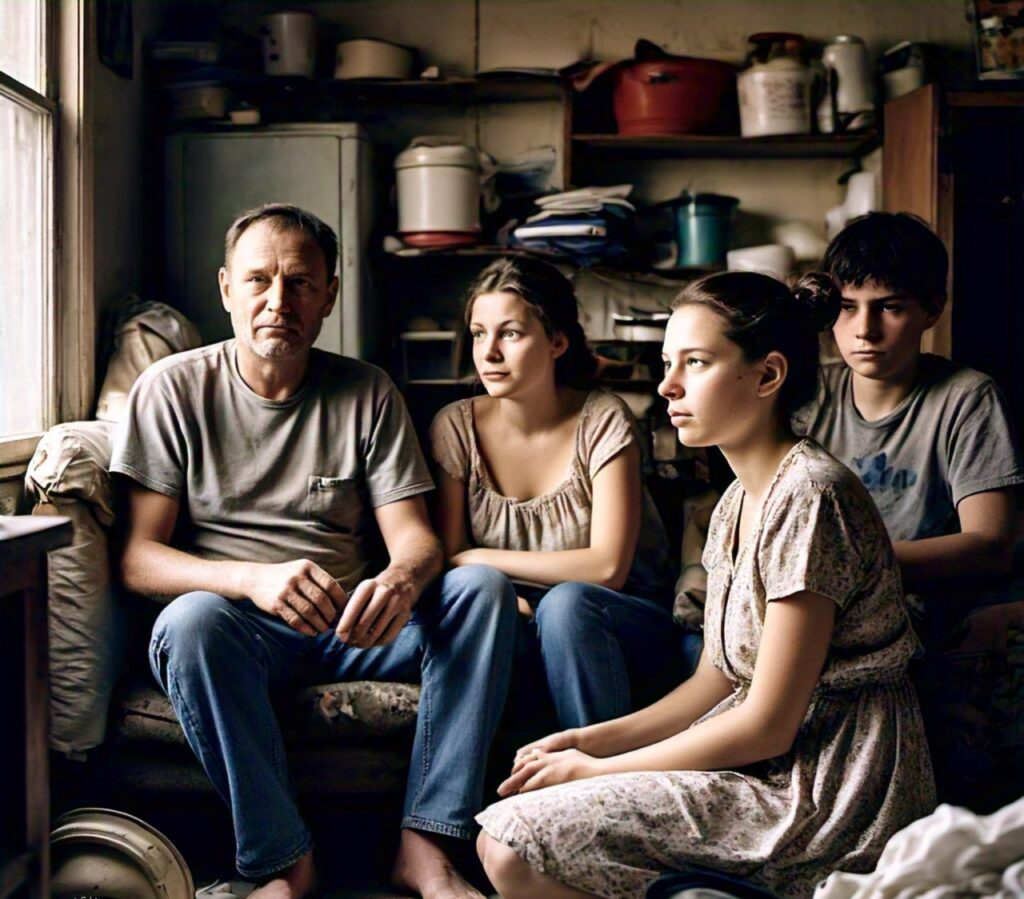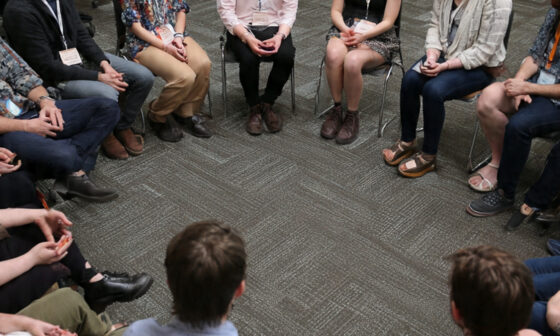What happens when unbalanced boundaries shatter a relationship between parents and children?
Enmeshment trauma is one of the most misunderstood forms of emotional abuse, and this is why many suffer from it but do not realize its effects on their relationships with loved ones.
Childhood abuse may take various forms, and one of them is enmeshment. When discussing childhood and abuse trauma, most people think of neglect or physical violence, but a type of emotional abuse referred to as enmeshment is utterly different from the more commonly recognized physical neglect and abuse and can be very subtle.
Strong family bonds are an indication of a functioning family. Most of the time, families with a healthy dynamic share the same values and perspectives, but too much of a good thing can have negative consequences.
Family enmeshment occurs when the boundaries and roles blur within the family dynamic. It is a case of family members sacrificing their individual needs for the ‘greater good’ of the family. Most often, enmeshment occurs in the parent-child relationship, in which parents manage the child by imposing written or unspoken rules. Infringements can cause resistance, emotional abuse, manipulation, and guilt. Children raised with no defined or loose boundaries may have been subject to family enmeshment. This could result in enmeshment-related trauma.
A family that is enmeshed is one that is not able to define boundaries. It imposes a lack of trust and emotional dependency on a child to satisfy the demands of the emotional well-being of at least one parent or caregiver.
What is Enmeshment?
Enmeshment is a severe form of intimacy between people. It is typically seen in families, for example, between parents and children; however, it could be experienced in any romantic or social relationship. Low levels of independence or autonomy and excessive intimacy can characterize it.
A parent, for instance, could regularly talk to their child too much concerning their adult struggles and use that child as a listening ear to express their emotions. A parent might believe their oldest child will be an additional backup and assign significant responsibility to the child’s care. They may also feel they can use their child as someone to vent their frustrations or let out steam, making them a sounding board for their issues.
Enmeshment is a relationship structure between two or more persons with unclear personal boundaries. It is a characteristic of dysfunctional families and impacts relationships inside and outside the family. In the family, personal identity isn’t embraced or appreciated. Outside the family, people-pleasing compulsions can be crippling. Survivors of enmeshed systems struggle to establish a sense of self and can be unable to assert themselves.

What is Enmeshment Trauma?
When you consider childhood traumas, You might imagine neglect, but in reality, being too close can result in enmeshment trauma.
Enmeshment trauma is one of the types of emotional trauma in childhood, which is caused by an inability to respect personal boundaries as well as a loss of autonomy among individuals. Enmeshment aims to establish emotional control and authority inside the home. Children who experience this could feel that their emotional needs were not being met due to a lack of individuality or appropriate role in the enmeshed family.
This kind of intimacy can be traumatic for children exposed to situations that adults should be able to protect them from. In addition, enmeshment trauma could be experienced when children are required to adopt adult reactions or emotions.
In this case, a child could be “parentified,” meaning that the child assumes taking care of the parent’s emotional needs. This could be a mom telling her daughter, who is in her teens, about concerns with her husband and expecting her daughter to be on her side.
There are many reactions to emotional trauma; however, it is crucial to identify the relationships that are enmeshed, manipulative, and possibly harmful.
Enmeshment is a broad spectrum; certain people can define boundaries more easily and quickly than others based on their environment and experience. When families are dysfunctional, children might want to ward off conflict through the “fawn” reaction to trauma, which they accept to satisfy the needs of their peers. When a relationship is tense, the fawn trauma reaction is a way to soothe or please to avoid conflict or resentment.
Understanding Enmeshment in Family Dynamics
Enmeshment is a term that was invented in the year 1970 by Salvador Minuchin, who specialized in the study of family systems. The system is another term used to describe a group of people. Enmeshment can also be called covert incest, also known as emotional incest.
If enmeshment occurs within a family, the lines between parents and children are usually blurred, and the child’s spaces of emotional intimacy are eroded. Children typically struggle to develop an independent sense of self-identity outside of the emotional assistance they provide to one or both primary caregivers.
The enmeshment between parents and children can be a source of confusion for children. It could appear like they’re close to their parent in a way that makes them feel superior or special in comparison with other siblings. They may believe their parent is their best friend or be told that directly.
The closeness of families is something that a lot of families cherish. However, the insufferable relationships within a tightly knit family structure can hamper a child’s growth in identity, mental health, and social and (later in adulthood) relationship with love.
Children who are enmeshed in family systems are often confused about their roles where they are unsure of who they are as an individual, independent of the position they’ve been given within the household (i.e. the parent’s surrogate spouse, confidant, or friend).
In families where emotional incest may be prevalent, children may be able to take care of the parent more frequently than the parent is attuned to the child’s needs. This isn’t always obvious and usually happens without the child’s and parents’ consciousness, making it a difficult syndic to identify or fix without the assistance of a professional.
Characteristics of Enmeshed Families
The majority of healthy families are committed to each other and can share certain values. In a family that is enmeshed, loyalty and shared beliefs can come at the cost of individual autonomy and well-being. For instance, the whole family may agree with the notion that the father is an excellent parent or leader, even if he is physically abusive.
Enmeshment does not always lead to abuse; however, it can be an effective tool to protect perpetrators of abuse from the repercussions of their behaviour.
Characteristics of enmeshed family systems are:
- Every family member plays the role of a particular person. In most cases, the roles allow the dysfunctional behaviour of others in the family. For instance, the family peacemaker can ease the tensions caused by family abusers or maybe guilt trip other family members for trying to establish healthy boundaries.
- Enmeshment usually begins when a family member suffers from a mental health issue or has a substance abuse problem. Enmeshment can be a way to normalize harmful behaviour. It could be a means to stay out of treatment.
- Family members who are enmeshed view discord as a sign of betrayal.
- Families with close ties can demand an uncharacteristic level of intimacy, even among adults. For example, an adult with his own kids may be expected to spend every holiday with the family. If they spend a holiday with in-laws or their own family, the enmeshed family may shun or punish them.
- The emotions of family members are entwined. It is sometimes difficult to determine where a person’s feelings begin and another’s ends.
- There could be family rules that family members consider to be normal. Others may see these rules as odd or unnatural. For instance, an enmeshed family might have a rule that they will not call the police on a family member that has a problem with their spouse and is abusive.
As you read above, enmeshment can also mean covert, also known as emotional incest. It is the case when a parent or other caregivers treats a child as an equal or a partner. Parents may depend on the child’s unconditional love and support instead of fulfilling the child’s basic needs.
How is Covert Incest Different from Enmeshment Trauma?
Covert incest, also referred to as emotional incest, is a kind of emotional abuse that occurs when a caregiver or parent engages children in an unsafe and harmful manner, often blurring the lines between the parent-child relationship and an intimate or sexual relationship. This is different from enmeshment trauma, but when a child is exposed to covert incest, often enmeshment trauma also occurs.
In the case of covert incest, parents or caregivers rely on the child to provide psychological support and validation or even companionship, all of which must be offered by an adult companion or a trusted friend. The child might be required to meet the needs of the caregiver or parent, like listening to their concerns, caring for the emotional demands of their parents or caregivers, and offering companionship and affection.
The child in covert incest is not physically abused or touched sexually; however, the psychological and emotional impact could be as devastating. The child may be embarrassed, confused, shamed, and accountable for the emotional well-being of their parent or caregiver. They may be struggling with boundaries, intimacy, low self-esteem, and various other psychological and emotional issues that can last until adulthood.
Covert incents are difficult to detect and are often hidden or ignored by the parent or the caregiver. It is also traumatizing for children, who may not understand the situation or know what to do to assist. But with the help of therapy and guidance, victims of covert incest can recover from the trauma, learn to heal from the emotional abuse, and move forward with their lives.
What are The Signs of Enmeshment?
Enmeshment can be confusing, and there aren’t any simple answers since both parents and children may be victims of these interactions.
The parent is so involved in their child’s life that the child feels trapped and unable to develop independently.
The signs of enmeshment are:
- The parent begins treating the child as a counselor or best friend by discussing their issues and intimate details about their lives that are inappropriate for children.
- The parent is vilifying another parent and tries to convince the child to take their side.
- The parent depends on their child for companionship, typically expected from a spouse.
- There are little or no boundaries of privacy between the parent and child.
Here are a few phrases used by a parent to guilt the child into staying put in the enmeshed relationship:
- “Don’t ever leave me.”
- “I only live for you.”
- “You’re all I have”
- “My only purpose in life is you.”
Enmeshment and Avoidant attachment style
Enmeshment during the early childhood years can alter an individual’s attachment style. Enmeshed children can develop an avoidant attachment style within their adult relationships. The child grows up and, in adult relationships, is subconsciously afraid that when someone gets too close, it will result in a loss of independence and autonomy. The avoidantly attached fear being suppressed, controlled, or dependent because they are conditioned to associate intimacy with hurt.
Signs of Enmeshment Trauma
Although it might appear different in various families, there are some common indications and symptoms to watch out for in the event of enmeshment trauma. At a minimum, keeping track of the behaviours can be beneficial. If you’re part of this family dynamic, you should exercise prudently.
Lack of Boundaries
Enmeshment’s goal is to increase control and authority in the household. A lack of boundaries can cause confusion about identity and roles in which people feel they aren’t able to make a statement or a personal choice. They can be constantly sacrificing themselves to improve the lives of their family or someone else to have their needs satisfied. This could lead to anxiety, unrealistic expectations, and guilt.
The biggest hurdle in saying “No” is that we fear we’ll be perceived as negative or ineffective. When we say “Yes,” it is believed to be brave and kind.
The simple decision to say “No” is powerful and is often an act of bravery.
To be productive, reduce stress, and avoid wasting time, it is essential to master the act of saying No, an art that many struggle with.
What’s the hardest part to saying “no? First of all, it could make people angry, hurt, or be disappointing to the person to whom you’re telling “No”, and this isn’t a very enjoyable job. If you’re hoping to collaborate with the individual in the near future, then you’ll want to maintain a positive rapport with the person you’re saying “No” to, and using the word “No” in the wrong manner could jeopardize this.
If you’re ever inclined to affirm “Yes,” be aware that you have immense potential in being able to say “No,” and sometimes, it’s the best option.
It doesn’t have to be a burden or a strain on your relationships. Here’s how you can stop people-pleasing and master the gentle art of refusing to be pleased.
Continue Reading: The Power Of Saying “No” For A Less Stressful Life
Lack of Privacy
Families may go overboard in monitoring and infringe on others’ privacy. The invasion of privacy can give parents an illusion of control (paradox of control). However, it can be detrimental and harmful to children. Even if they have arguments to justify the invading privacy issue, it is another sign of poor boundaries and disrespect.
It can cause children to desire to intrude into their privacy or experience anxieties when they do not feel they are in control. If a parent is too strict, it may cause embarrassment and frustration to a child who attempts to develop their identity and explore their connections and interests.
Feeling Responsible For the Feelings of a Parent
Children in this family dynamic may believe that they are more influential and have the power to work things out for the family than they actually do. For instance, children may become used to being required to comfort parents, provide for parents (cooking, cleaning, etc.), or be present at all times.
Parents who can’t keep their mental health under control can count on their children to convince them they are worthy or important. Children may be scared to upset their parents and worry about being responsible for their health.

Pressure to Live Up to Your Parents’ Ideas for Your Future
Parents often believe they know the kind of person their child will become or should be. They might want their child of a certain age in their thoughts, conduct, and behaviour to act in a way that “represents” their (parent’s) character in particular, as well as the aspects they consider worth mentioning.
This could come from a place where the parent wants some kind of recognition and validation. If they’re unhappy with the choices of their adult child, this discomfort is most likely stemming from their own inner anxiety and self-reflection.
Avoiding Conflict
Avoiding conflicts is a typical emotional response for those who have been in a kind of relationship in which issues were not resolved and often blamed for conflicts. People who avoid conflict tend to avoid or retreat from conflicts due to anxiety or fear that they’ll be accused, blamed, forced to accept negative feelings, or end up losing the relationship.
Lack of Identity Outside Your Family
Sometimes, people are conditioned to feel apprehensive about the world beyond their family. They may fear new relationships or even be skeptical of other people. It could be because of the effect of manipulative behaviour on them and the guilt that keeps them in a dysfunctional family structure.
The notion of “family is everything” may have been taken too far for someone with enmeshment trauma. The phrase is often repeated to persuade family members not to go out independently and develop a sense of identity.
Complicated Interpersonal Relationships
A person who has not healed from childhood trauma may feel like they have no space for other people in their lives. It’s difficult to believe in them, and it could appear that they have all their needs met by the family members (e.g., father, mother, or sibling).
If left unresolved, these habits can be passed down over generations. If someone you love has a negative relationship with their family members and does not want to make any changes, They may not be aware of the behaviour they pass on to their children. That’s why the cycle goes on.
Types of Enmeshment in Families
Enmeshment can come in various ways, such as romanticized parent, helicopter parent, incapacitated parent, and scapegoating:
Romanticized Parent
Emotional Incest, also called covert incest, is a form of abuse by parents. It can occur in homes with a single or dual parent.
- It begins when an adult visits the child to get the emotional intimacy that their adult relationships lack.
- The parent might treat the child as the best friend.
- There’s no sexual aspect in emotional incest.
However, it could be an inappropriate exposure to sex. A parent, for instance, might be too open with their child about their private sex life or become jealous about their children’s romantic relationships. In return, a child may over-idealize their relationship with the parent in order to protect themselves from the discomfort the relationship causes emotionally.
Helicopter Parent
In its extremes, helicopter parents represent a type of enmeshment. Parents naturally desire to protect their children from physical or emotional harm, but a healthy, balanced approach to parenting lets children deal with their own issues. Helicopter parenting executes extremely high levels of control.
Parents who are helicopter parents might attempt to justify certain actions by saying that they are concerned about safety, but psychologically, it is more about control and power. The helicopter parent might appear worried and anxious; however, their actions help them feel at ease and in control and reduce anxiety at the expense of the child. Helicopter parents force dependency, stunted growth, and lack of coping skills on their kids.
Incapacitated Parent
Caring for those who are incapacitated or disabled can be emotionally and physically exhausting when the family doesn’t have adequate support or alternatives for caring. For children who grew up with a parent who required caregiving, their needs might not have been addressed and acknowledged. Children and adults of parents with high needs may have difficulty establishing their own identities and boundaries.
Scapegoating & Favouritism
Favouritism and scapegoating in families are references to the starkly different ways of treating children. The scapegoat child may become the victim of family conflicts, while the favorite child can appear to be doing no harm. One parent might use the other child to vent their frustrations and try to “make amends for” poor parenting by blaming the other. This can cause a variety of problems for both children, which include low self-esteem as well as unrealistic expectations for self-esteem.
Why Does Enmeshment Happen?
Enmeshment often happens between a parent and child when another adult doesn’t meet the parent’s emotional needs. For example, in divorced families or split households, parents may intentionally or unintentionally share personal/relationship issues with their child in order to get their sympathy and sway their feelings in favour of one party.
It doesn’t matter if it’s intentional or not; the child could be pushed into a tangled relationship triad, referred to as a “third parent,” taking care of their children and compensating for their parents’ shortcomings and neglect. Although it’s usually normal and is a crucial development phase for children to assist in caring for their peers, enmeshment can refer to a specific type of disrespect for boundaries.
Impact of Enmeshment Trauma
Trauma caused by enmeshment may cause certain long-term mental health issues
Being Afraid of Conflict
Those who grew up in an enmeshed family may be incredibly conflict-averse. It was never emotionally safe in their home to argue with their parents when they were children, so they believe that arguing with someone as an adult won’t be safe either.
Difficulty In Relationships
It is not uncommon for those who suffer from trauma from enmeshment to have trouble forming and maintaining friendships, as well as romantic relations.
When they feel smothered and abused by one or both parents, they might expect their spouse or friend to be afflicted by the same emotional needs too. The other option is for those who seek relationships in which they will be the primary caregiver once more, playing the role they learned in their childhood as they continue to perpetuate the pattern.
Low Self-Esteem
Many people from families that are enmeshed are likely to have low self-esteem because they depend so heavily on their parents’ approval; this often manifests in adulthood as a lack of confidence in one’s self and decisions for fear of judgment.
Lack of Self Identity
Enmeshment can be described as doing all one can to make others happy. Hence, a person who suffers from enmeshment-related trauma might do everything to please people but have no idea what is actually helpful to them.
If you’ve chosen an occupation, a spouse, a place to live or all of these based on what your parents believe is best; it could be difficult to determine who you are without their guidance.
Emotional and Functional Consequences
An absence of self-identity can cause disassociation issues, including depersonalization (feelings that the self is not real) and derealization (feelings as if the universe isn’t real). These are normal
reactions to trauma in people who do not feel they have any control or choices in their lives.
Trauma Bonding
Trauma bonding is a term used to describe the relationship between the abused and the abuser. Trauma bonds typically keep people trapped in a vicious cycle of remaining or returning to an abusive relationship. If someone is dependent on or absorbed in another person, When someone becomes reliant on or immersed in another person, they can think they need that other person in their life in order to survive; this makes the relationship very hard to end.
The abuser, or the person in control, has likely been calling the conscious or unconscious shots for them. Enmeshment does not allow for boundaries, and for those who are victims in a trauma-bonded relationship, they’ll lose control and could lose their perception of reality once they completely separate from themselves.
How Enmeshment Enables Abuse
Enmeshment is not always a path to violence; however, it can be a powerful tool to shield those who abuse others from the consequences of their actions. Enmeshed families can defend each other and may view extremely harmful behaviours as normal and acceptable.
Enmeshment can make it difficult for a person to form close relationships with other people. Without such relationships, it is difficult for families with a lot of enmeshment to realize that their family’s style of relationship is not healthy.
Even when enmeshed family members do form outside relationships, their enmeshed family may intrude on these relationships. The enmeshed person may view their family as normal and their partner as the problem. For example, an adult may still prioritize their childhood family over their spouse, expect their spouse to defer to family members, or accept abusive behaviour.
The Trauma of Enmeshed Families
Enmeshment can be traumatizing in its own right, particularly when it normalizes abuse. In other instances, however, it is a result of trauma. A severe illness, a natural catastrophe, or an abrupt loss can result in a family becoming very close in an effort to defend themselves. If this behaviour continues past the trauma, enmeshment diminishes its value as a protective measure and may compromise every family member’s autonomy.
Enmeshed family systems are often dismissive of trauma. Parents might ignore their night of drunken violence as a normal response to the poor grades of a child. In later years,
siblings might defend their parent’s actions by claiming they were suffering from extreme stress or that the violence was the children’s fault. By dismissing trauma as normal or deserved, enmeshed family systems make it difficult for family members to understand their emotions and experiences. In the form of gaslighting, an individual might consistently substitute the family’s collective judgment for an individual’s feelings. Over time, the individual may struggle to distinguish their emotions from those the family insists they should have.
Read More: What is Guilt Trip and How to Live Above it
Read More: What is Gaslighting: How to spot the signs and shut it down
Read More: Self-Criticism: What It Is, Examples, and How to Overcome It
How to Heal from Enmeshment Trauma
The positive side is that it’s always possible to recover from enmeshment trauma. Although it might sound frightening initially, it’s ultimately worth it. It isn’t easy to separate yourself from an uneasy family and to discover yourself as a person.
However, there are effective methods to get help and find healing from the effects of PTSD. The healing techniques include establishing boundaries, discovering yourself, and seeking help from therapy.
Here are the strategies to heal from trauma resulting from enmeshment:
Create Boundaries
It can be challenging to set boundaries since we might think it’s hurtful or immoral to say “no.” However, overcommitting yourself isn’t good for you or anyone else because it’s inauthentic and creates a false sense of your human capabilities. There’s plenty of pressure to make yourself available to everyone; however, ignoring yourself is terrible.
Find Yourself
Identity and values are essential parts of healing from trauma caused by enmeshment.
- Find out what you love and dislike
- Explore new ideas
- Re-discover yourself
You can explore and look into many aspects that have been buried or believed incorrect. Expressing “yourself” is a complex process that requires time; however, it can be incredibly satisfying and liberating once you’re on the other side.
Don’t Feel Guilty
People with enmeshment trauma struggle with guilt and may experience anxiety when making choices for themselves compared to others. It is essential to overcome this guilt and know where it originates. It’s not serving any good reason and causes you to be in an uneasy state.
Seek Professional Help
Childhood experiences are extensively studied in therapy for a reason. We develop harmful behaviour patterns and thoughts that must be reviewed and altered. It is essential to locate a therapist proficient in dealing with child abuse, trauma, and neglect issues. It can require some time; however, that’s completely normal.
Be Patient
It’s vital to be patient when you revisit painful experiences. It’s common to want to find a quick solution, but debunking and exploring long-standing issues can take more than hours, weeks, or months. It is beneficial to acquire skills to assist you in managing your stress as you figure out what’s best for you today and in the future.
Breaking the Enmeshment Cycle
Enmeshment is usually repeated intergenerationally. In families with unprocessed trauma or enmeshed roles, children who served as their parent’s surrogate partners may find themselves repeating the cycle with their children.
Although resolving enmeshed relationships can be difficult and sometimes painful, many people can recover, set limits, and finally have the chance to focus on their needs and provide them with the opportunities they didn’t get as a child; they also create healthy and happy relationships.
Individual or family therapy, with a therapist trained to recognize the dysfunctional or enmeshed family dynamics, helps you identify and re-evaluate your relationships with your family while maintaining those aspects of your relationship that are rewarding and healthy.
Conclusion
Your parents likely tried to look after you as best as they could, knowing that the dynamics they created weren’t working on your behalf doesn’t cause them to be bad people or imply that you’ve had a lousy childhood. It just means that you want to do things differently for yourself, and you should be proud of wanting to take care of yourself in that way.
While having a close relationship with your family can be beneficial, too much involvement without boundaries can cause enmeshment trauma.
Therefore, establishing boundaries within your family and defending yourself whenever the emotional connection makes people uncomfortable is essential. Indeed, being raised in enmeshed families isn’t healthy; remember that you can end this harmful cycle. Family is an integral part of life; however, it’s unacceptable when these family relationships harm our mental well-being.





